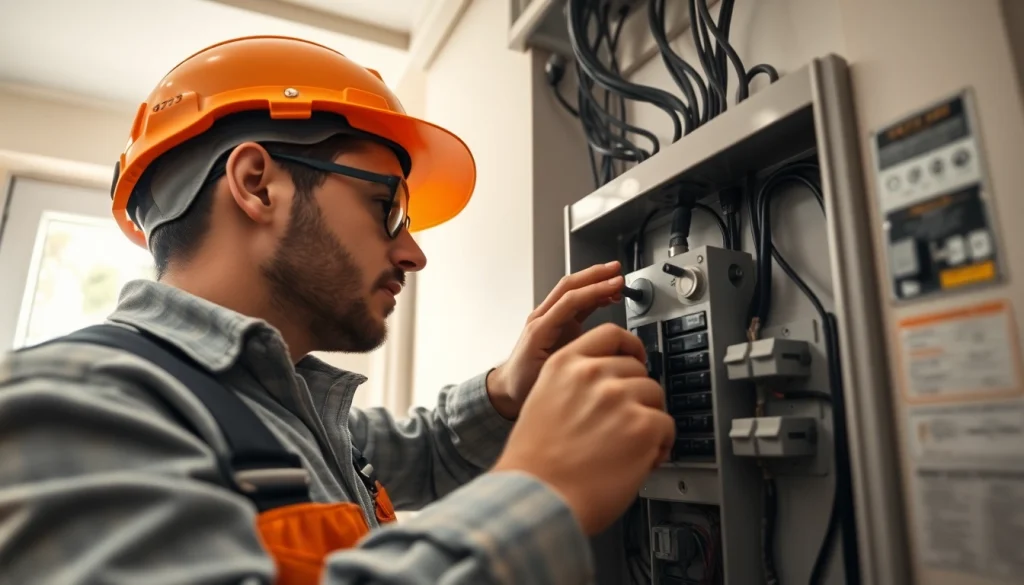Understanding the Need for an Electrical Panel Upgrade
The modern home relies heavily on electricity for daily functions, from lighting and heating to powering electronics and appliances. However, as our energy needs grow, the electrical panel—often referred to as the breaker panel or service panel—may require an upgrade to keep pace. An Electrical Panel Upgrade can enhance safety, increase performance, and ultimately improve the overall efficiency of your home’s electrical system.
Signs Indicating an Electrical Panel Upgrade
It is crucial to monitor your electrical system for any signs that indicate the need for an upgrade. Some common signs include:
- Frequent Circuit Breaker Trips: If your circuit breakers trip often, it may indicate that your electrical panel is unable to handle the load, suggesting it’s time for an upgrade.
- Flickering or Dimming Lights: Light flickering when appliances are in use could be a sign of insufficient power supply.
- Burning Smell: Any burning smell from the panel indicates a serious issue. This may require an immediate upgrade or repair.
- Old Panel Type: Homes with fuse boxes or panels that are more than 30 years old may need an upgrade to meet current safety standards.
Benefits of Upgrading Your Electrical Panel
Upgrading your electrical panel offers numerous advantages, including:
- Increased Capacity: Newer panels often support more amperage, allowing you to power more devices and appliances simultaneously without tripping breakers.
- Improved Safety: Modern panels come equipped with better safety features that protect your home against electrical faults.
- Enhanced Energy Efficiency: Upgrading can lead to reduced energy costs through improved load management and distribution.
- Increased Home Value: Modern electrical systems can be a selling point when listing your home on the market.
Common Misconceptions About Electrical Panel Upgrades
Several misconceptions tend to deter homeowners from investing in an electrical panel upgrade:
- It’s Too Expensive: While costs can vary, many homeowners find that the long-term savings and improved safety outweigh the initial investment.
- Only Necessary for Older Homes: Newer homes can also benefit from an upgrade due to increased energy demands from modern devices.
- DIY is Sufficient: Electrical upgrades often require permits and inspections, making it essential to hire a qualified professional.
Evaluating Your Current Electrical System
Assessing Electrical Load Requirements
Before upgrading your electrical panel, assessing your current electrical load is essential. Calculate the total amperage your devices and appliances draw, including everything from lighting to heating and cooling systems. This analysis can guide you in determining the appropriate panel capacity.
Identifying Common Electrical Problems
In addition to load assessment, documenting and identifying existing electrical issues within your home can provide further insights. Look for:
- Outdated wiring that does not meet current safety standards.
- Frequent flickering lights or buzzing outlets.
- Overheating outlets or the panel itself.
Importance of Safety Codes and Compliance
Electricity is inherently dangerous, and compliance with local safety codes is paramount. Ensure your upgraded panel meets all local building codes and standards to avoid legal issues and enhance safety.
Choosing the Right Type of Electrical Panel
Understanding Amperage and Panel Types
When determining the right electrical panel, comprehend the various amperage levels. Common residential panels are typically rated for 100, 150, or 200 amps. Higher amperage ratings allow more devices to be powered concurrently. Consider your current and future power needs when selecting the panel.
Considerations for Smart Panels
With advancements in technology, smart panels have emerged, offering features such as remote monitoring, operational alerts, and enhanced energy management capabilities. These panels can offer greater convenience and efficiency, making them an appealing option for tech-savvy homeowners.
Cost Analysis of Different Panel Options
Cost varies significantly based on the panel type, amperage, and installation. Standard upgrades may range from $800 to $4,000, influenced by labor costs and any additional electrical work required. It is advisable to obtain multiple quotes from qualified electricians to ensure a fair price.
The Electrical Panel Upgrade Process
Steps Involved in the Panel Upgrade
The process of upgrading your electrical panel typically involves several key steps:
- Initial Assessment: Hire a licensed electrician to assess the current electrical system and determine the necessary upgrades.
- Permits and Planning: Once the needs are established, secure the required permits and prepare for the installation.
- Installation: The electrician installs the new panel, ensuring everything is properly connected.
- Inspection: After installation, local authorities may conduct an inspection to verify compliance with safety standards.
Permits and Inspections Required
Most areas require permits for electrical work to ensure compliance with national and local codes. It’s essential to check with local building departments and understand the inspection procedures involved.
Choosing a Qualified Electrician
Choosing the right electrician is crucial for the success of your upgrade. Look for a licensed and insured professional with experience in panel upgrades. Verify their credentials, read reviews, and ask for referrals from friends or family who have had similar work done.
Post-Upgrade Considerations
Ensuring Proper Functionality and Safety
After upgrading your panel, performing routine checks is vital to ensure everything is working correctly. Regularly test circuit breakers to ensure they trip as intended. Ensure there are no signs of overheating or damage.
Future-Proofing Your Home’s Electrical System
Upgrading your electrical panel prepares your home for future electrical demands. By considering additional capacity, installing smart panels, or integrating sustainable energy solutions, homeowners can future-proof their space effectively.
Maintaining Your New Electrical Panel
Regular maintenance is essential to ensure the longevity of your new panel. Schedule periodic inspections with a licensed electrician, clean the panel to remove dust and debris, and keep the surrounding area clear to ensure adequate airflow.
